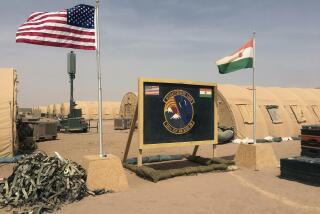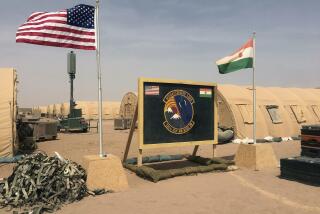Last of Its Troops Will Leave Angola, South Africa Says
- Share via
CAPE TOWN, South Africa — The last South African troops in Angola will withdraw across the border into Namibia by the end of this week, Foreign Minister Roelof F. (Pik) Botha announced Monday amid new moves on Namibian independence.
Botha said the move is to show South Africa’s good faith and revive negotiations on a major issue blocking Namibian independence--the departure of most of the 30,000 Cuban troops stationed in Angola. South Africa administers Namibia, also known as South-West Africa, in defiance of the United Nations under an expired League of Nations mandate.
“South Africa trusts that its decision to complete the disengagement process will enhance the prospects for peace in the region and will, in particular, be conducive to the withdrawal of the Cubans from Angola,” Botha said.
But South Africa is also increasing its pressure on the South-West Africa People’s Organization by encouraging a coalition of centrist and right-wing political parties in Namibia to form a “transitional government” without it. The organization, known by its acronym SWAPO, is the most powerful Namibian black nationalist group and has fought a 19-year guerrilla war against South Africa.
The United States and three other Western countries warned South Africa on Monday to adhere to a U.N. plan for Namibian independence and not to promote an “internal settlement” that would exclude SWAPO.
U.S. Ambassador Herman W. Nickel and envoys from Britain, Canada and West Germany told Botha that such a settlement would not win international recognition and could not bring peace to Namibia. The four countries are members of a Western “contact group” working for Namibian independence under the U.N. plan.
South African President Pieter W. Botha is scheduled to respond later this week to the proposal by Namibia’s Multi-Party Conference for a transitional government, and political observers here have predicted that he would give cautious approval, while stressing the ultimate need for an internationally acceptable settlement.
“The Americans were as tough as they could be without becoming angry,” one well-placed diplomat said of Monday’s exchange between Nickel and Foreign Minister Botha. “The United States is worried, of course, that its own efforts will be undercut by South Africa’s moves.”
Last month, Washington put forward its proposals for bringing independence to Namibia under the basic U.N. plan, but so far neither South Africa nor Angola has made a formal reply. The elements of the U.S. proposal remain secret.
South Africa’s decision to withdraw the last of its forces--several thousand troops--from Angola, where they have fought on and off for nearly a decade, appeared to Western diplomats to be based on three considerations. These are the failure of SWAPO’s annual rainy season offensive, now drawing to a close; the desire to place on Angola the burden of preventing SWAPO infiltration into Namibia, and, most important, a wish to demonstrate to its other neighbors that South Africa keeps its commitments.
South Africa agreed in February, 1984, to withdraw its forces from Angola, where they had established positions three years earlier, and quickly pulled back to Ngiva, 25 miles inside Angola, north of the Namibian border.
But the full South African withdrawal has been delayed for more than a year. Meanwhile, negotiations on Namibian independence have dragged on inconclusively, as Angola tried to reach an understanding with SWAPO, most of whose forces are based on its territory, and as the South African military pursued its campaign against the guerrillas.
Late last year, South Africa unsuccessfully sought to get an agreement from Angola on policing the border in the future and on continuing consultations between the two countries, which do not have formal diplomatic relations.
Finally, the South Africans decided on a unilateral move, a step required under the original agreement signed in Lusaka, Zambia, last year, expressing their hope that this will encourage negotiations on the future of Namibia and related issues, such as the withdrawal of Cuban troops.
Foreign Minister Botha warned, however, that South Africa’s forces in Namibia “will not hesitate to take whatever action may be necessary should SWAPO step up its cross-border violence.”
More to Read
Sign up for Essential California
The most important California stories and recommendations in your inbox every morning.
You may occasionally receive promotional content from the Los Angeles Times.










